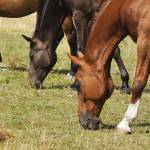Causes of Death in Retirement Facilities for Horses

The primary causes of death among horses at a retirement facility include colic, lameness, neurological deficits, and the cumulative effects of old age, according to new research from the Netherlands.
Using records from a private equine retirement center gathered over an eight-year period, researchers aimed to pinpoint the most common causes of death in aged horses and, more specifically, to determine the effects of pituitary pars intermedia dysfunction (PPID) on mortality.*
For this study, any horse 15 years of age or older was considered geriatric.
After an exhaustive review of records, researchers created fourteen categories for the cause of death: colic, lameness excluding laminitis, laminitis, down in the field, neurological deficit, sudden death, acute illness, chronic weight loss, tumor, fracture or trauma, behavior, financial, and old age. A “financial” cause of death indicated euthanasia occurred because of an owner’s inability to pay for care, and “old age” designated a horse with multiple problems that cumulatively decreased welfare and whose life ended by planned euthanasia.
All horses at the facility were overseen by professional horsemen and veterinarians and were provided with routine care. Testing for PPID occurred if there were any clinical indications of the disease (cresty neck, history of laminitis, chronic infections, weight loss).
Of the 194 horses that resided at the facility, 80 geriatric horses died during the eight-year period. Twelve were between the ages of 15 and 19 years old, 25 were between 21 and 25 years old, 32 were between 25 and 30 years old, and 11 were 31 or older. The average age of those horses that died was 26 years old. All were euthanized or died of natural causes.
The most common cause of death among this population of geriatric horses was colic (20% of cases) followed by old age (15%) and lameness that did not involve laminitis (12%). Neurologic problems and an inability to rise after lying down rounded out the top five causes of death.
“For those of us that live and breathe horses, that spend time each day with horses, that study horses, these causes of death come as no surprise,” said Catherine Whitehouse, M.S., a nutritionist with Kentucky Equine Research. “The interesting aspect of this study is that this data was all mined from the records of horses housed at a single facility under similar management conditions. Because of this, there was less variation in care than there would have been if horses had been managed at multiple farms.”
With regard to PPID, of the 194 horses that resided at the facility, 125 (63%) were tested at least once for PPID. During the eight-year-study period, 62 horses of the 125 tested died, and 47 of those 62 (76%) had tested positive for PPID at an average age of 27 years old.
According to the study, horses were maintained on a diet of free-choice haylage with and were offered supplemental feed if necessary. The teeth of all horses were examined regularly and those with missing or problematic teeth were given mashes when necessary. Weight was monitored monthly using scales. “The horses at this facility appeared to be given top-flight care, especially when it came to provision of adequate feed, dental care, and regular deworming, all of which is important when it comes to lifespan,” Whitehouse said. “Old horses sometimes require more management, but the extra investment may pay off in added years at the end of a life.”
Aged horses often benefit from targeted supplementation. High-quality joint supplements can help ease the discomfort associated with the effects of a lifetime of service, and a research-proven hindgut buffer, like EquiShure, can help stabilize the pH of the hindgut so microbes can efficiently ferment forages.
*Van Proosdij, R., and S. Frietman. 2021. Retrospective analysis of cause-of-death at an equine retirement center in the Netherlands over an eight-year period. Journal of Equine Veterinary Science 110:103824.








